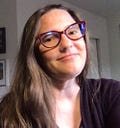What is philosophy to you?
Philosophy for me is much more than an intellectual pastime. It is a therapeutic intervention, a liberatory practice, and an activity of love. When I think about the ancient roots of philosophy in the Socratic mission to examine one’s life, to try to figure out what a healthy human life looks like, and then to try to live it, I am struck by philosophy’s practical power to heal soul-sickness, ease suffering, free us from ignorance, injustice, and tyranny, and create bonds of friendship through which we care for each other’s well-being.
While the well-known Socratic practice of examining old assumptions in dialogue is educative, it is also healing and freeing because those old assumptions hold us captive in different kinds of confusion, problematic power relationships, and self-limiting behaviors that cause us suffering.
When we philosophize together, and examine what in our old assumptions is true and false, what about them has benefited and/or hurt us, what some alternative perspectives might be, and how we can creatively put new ways of thinking into practice, we are offering each other a kind of care that is truly rare. That dialogical work is an activity of love: not only for wisdom but for each other as well.
How were you first introduced to philosophy?
My first taste of philosophy was in my high school literature classes. I didn’t know what philosophy was yet, but we read some existentialists (Dostoevsky and Kafka) and transcendentalists (Thoreau), and I recall dwelling deeply on those books and feeling inspired by them. I liked how subversive they were. (I thought I wanted to live like Thoreau alone in the woods…but with my dog…and frankly, I still fantasize about it.) In college, I started my studies thinking I wanted to be an anthropology or psychology major, but I was asking a lot of “inappropriate” questions in class that called into question the basic foundations of both disciplines. Later on, I realized that I was asking “philosophical” questions (and that not a lot of people appreciate those kinds of questions). By accident, I ended up in an Ethics class to fulfill a requirement, and I was hooked. My “inappropriate” questions found a home… although it was a home in which I was almost always the only girl.
How do you practice philosophy today?
After about 20 years in academic philosophy as a student and professor, I changed gears to practical philosophy. Now I offer individual philosophical counseling sessions, in which I help folks with problems surrounding meaning and purpose, core beliefs and values, identity and change, struggles with alienation, power relations, injustice, and the pursuit of empowerment and authenticity. I also offer philosophy workshops, in which small groups study classic and contemporary philosophy texts, discuss philosophical insights, relate them to life experiences, and find ways to put new wisdom into practice.
Why is philosophy important to you?
Philosophy first became important to me in college as I was transitioning out of rather toxic sports cultures, in which “the ends justify the means,” “winning is everything,” and “never question the authority of the coach” were long-held beliefs. Enduring abuses of power was a way of life that athletes had to swallow if they wanted to participate. I was hungry for tools that would help me understand what had gone wrong in that setting, how it had affected me, how I could keep it from happening again, and how I could emancipate myself and others from authoritarian and abusive power structures. Ethics, political philosophy, and feminist philosophy helped me build that tool set, and existential philosophy helped me understand what it means to be a free being who can carve out their own authentic path in life and define their own future. All these philosophies helped me gain ownership over my own life, define my own sense of purpose, and help others do the same.
What books, podcasts, or other media would you recommend to anyone interested in philosophy?
For those getting started with philosophy, it’s hard to beat some of the classics of ancient philosophy, like Plato’s Republic and Symposium, Aristotle’s Nicomachean Ethics, and Epictetus’ Enchiridion. If you’re getting into existentialism, Viktor Frankl’s Man’s Search for Meaning is a good place to start. Ready for a good debate with yourself? Try Friedrich Nietzsche’s On the Genealogy of Morals and Twilight of the Idols. Interested in feminism? It takes a while to read, but Simone de Beauvoir’s The Second Sex is quite the journey of awakening. There are a lot of online sources these days with strong philosophy sections that are accessible and relevant to the public. Check out Aeon and Psyche (sister publications), The Conversation, and my favorite blog The Marginalian (formerly Brain Pickings).
Monica Vilhauer, Ph.D. is the founder of Curious Soul Philosophy (www.curioussoulphilosophy.com), where she offers individual philosophical counseling sessions on problems surrounding meaning and purpose, beliefs and values, identity, alienation, empowerment, and authenticity. A former philosophy professor, she also leads small-group conversational workshops on classic and contemporary philosophical texts and works as a writer and editor. She is the author of Gadamer’s Ethics of Play: Hermeneutics and the Other.



